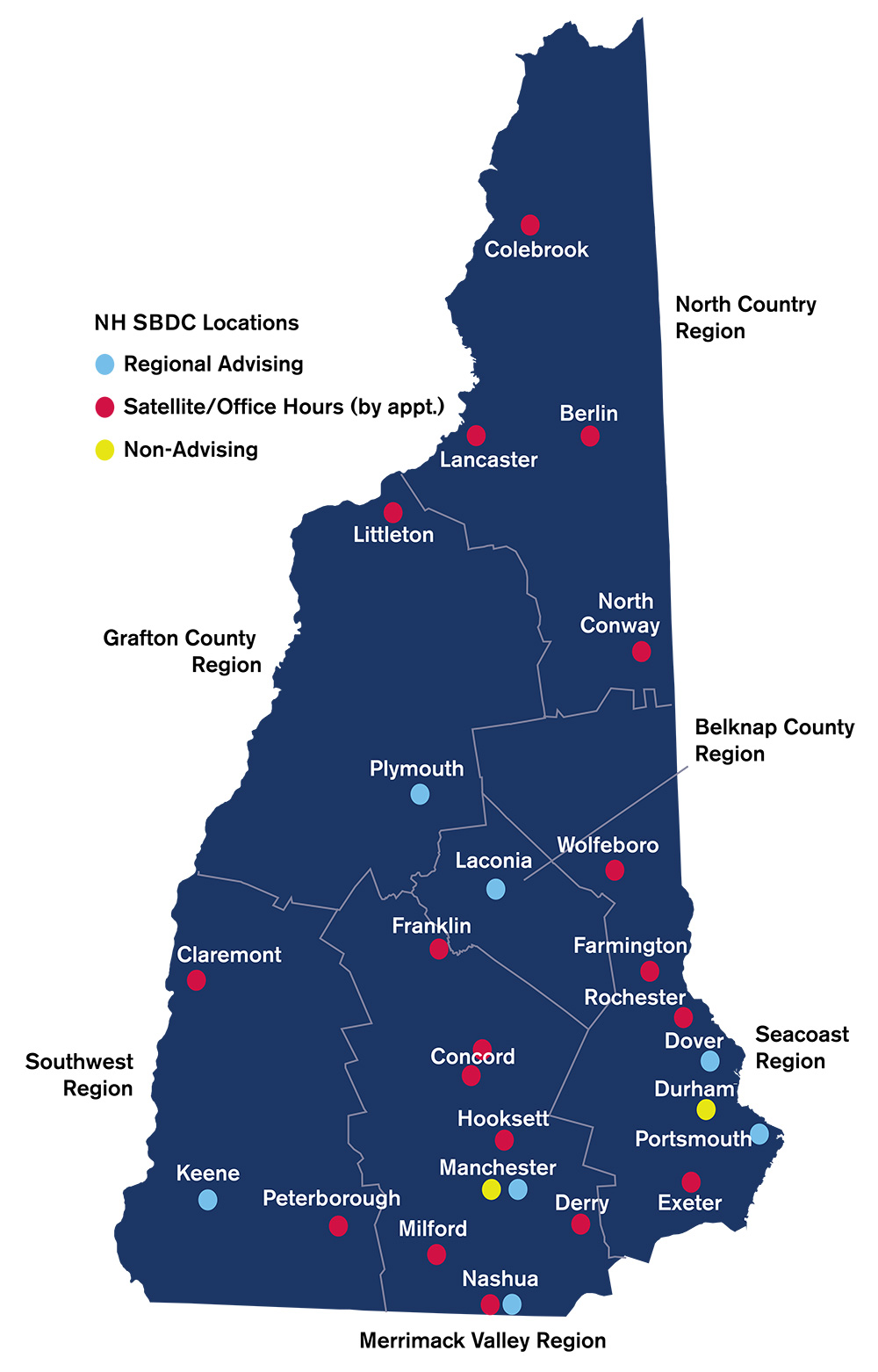
Guiding businesses through COVID
or more than 37 years, UNH has hosted the NH Small Business Development Center. For decades, NH SBDC was one of the Granite State’s best kept secrets. With the onset of the COVID-19 pandemic, it quickly became a lifeline to businesses across the state.
The COVID pandemic created challenges that tested people in ways no one could have imagined. New Hampshire’s small businesses were particularly impacted as they struggled to keep their doors open. Retaining employees, keeping supplies coming in, and pivoting to new health protocols were a few of the challenges they encountered and continue to face.
According to the U.S. Small Business Administration, there are approximately 137,000 small businesses in New Hampshire – 99 percent of all businesses in the state. They employ about half of the private workforce. Keeping them strong is paramount to the vitality of the state.
Located at the UNH Paul College of Business and Economics, NH SBDC provides confidential, highly individualized advising and education at no cost. The team works with businesses in any industry, at any stage of their lifecycle, from startup to mature, and from solo entrepreneur up to 500 employees.
NH SBDC annually works on average with 3,000 small businesses. However, since the beginning of the pandemic, they’ve helped almost 10,000 businesses with business advising and education to not only survive but thrive.

How did they do it? According to Gray it first required a fast pivot of their own operations to improve efficiencies, create strategic partnerships, and develop innovative programs to expand outreach efforts. The team needed to quickly learn new technologies and techniques to engage with clients remotely, making connecting easier and safer throughout the pandemic. She says of all things, she is most proud of how her team responded during the pandemic. “Our small but mighty team rose to the challenge, supporting each other along the way, and is now stronger than ever!”
In a typical year the top issues NH SBDC business advisors help their clients with are accessing traditional and nontraditional sources of capital and workforce development – both hiring and retaining. In addition to one-on-one, confidential business advising, it offers educational training programs and services designed to help a business take the next step and forge its path forward in specialized topic areas.

“I reached out to NH SBDC during the summer months of 2020. My concern was that my business could face significantly challenging obstacles if schools closed in the fall and my staff of 13 were unable to work,” said Christopher Dunstan, Dunstan Pediatric Services. “My advisor offered initial direction on applying for PPP,” “She then began to ask more probing questions like, ‘How will you meet the needs of your clients if you stay in a remote setting?”’and ‘How will you ensure your company growth continues even under this adversity?’ She challenged me to anticipate what my customers would need in the coming months and year, and then invest in ensuring I could deliver what was needed. I predicted that they would need reliable telehealth services and looked to find quality therapists that had the versatility and personality to make a new service successful. As it turned out, I was able to hire five therapists to manage telehealth services.”
With funding from the CARES Act, NH SBDC was able to add advising capacity and develop new programs. It conducted three phases of its Business Resiliency Survey with the UNH Survey Center in June 2020, February 2021, and September 2021 to assess the impact of the pandemic and better understand the immediate and long-term challenges and needs of New Hampshire business owners. It then teamed up with UNH Extension to offer the state’s first Resiliency Academy for Small Businesses and Communities to 265 attendees.

— Kristina Zontini, owner of Super Secret Ice Cream Club in Littleton
With the NH SBDC as an outreach program of Paul College, companies have many opportunities to work with students and faculty on various aspects of their business. Through the Paul Projects program businesses can partner with students who help solve a real business challenge in areas such as marketing, business analytics, supply chain management, and business development.
NH SBDC clients also can access marketing services at special pricing from Voice Z Digital, a unique digital marketing agency that offers a fresh Gen Z perspective because it is staffed by students at UNH. Services range from website analytics to content creation and social media management. Voice Z’s digital presence audit can provide businesses with a snapshot of their online landscape, as well as a view into what digital marketing efforts may grow their business. In the past academic year 14 clients took advantage of the audit opportunity, and 14 more are offered this year, sponsored by NH SBDC.

— Hailley Simpson, Voice Z managing director
NH SBDC and NH Tech Alliance kicked off a new Cybersecurity Initiative this year to help businesses better understand cyber threats and be prepared with adequate technology and planning. A web-based training program, including eCourses, live webinars, and a Cybersecurity Guidebook, are available to help businesses through cyber planning practices. Businesses can also access one-on-one advising related to cybersecurity.
Another initiative that recently kicked off is NH SBDC’s Inclusivity Project. NH SBDC has always supported entrepreneurs and small business owners from every walk of life, regardless of race, ethnicity, gender, sexual orientation, socio-economic status, age, religious or political beliefs. However, like many organizations, it wants to do more and is taking action.
“The purpose of the Inclusivity Project is to ensure our services are welcoming and inclusive to all entrepreneurs and small businesses,” Gray said. “The project’s approach is intentional and collaborative and is in the beginning stages. It will result in a comprehensive plan for NH SBDC to reach more entrepreneurs of color with business advising and education services.”